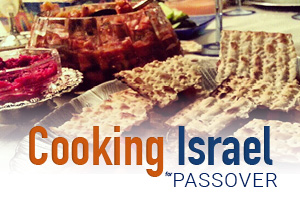Passover in Israel: Here It Comes!
What's it like to be in Israel where, according to a 2017 Jewish People Policy Institute survey, 97% of Israeli Jews host or participate in a Passover Seder?
If you've never heard an Arab calling out "alter zachen" ('old things') in Yiddish, then you've never experienced pre-Passover preparations in Jerusalem.
It's part of the clean-up mania that grips the city in the run-up to the Pesach holiday.
I remember the days when an old, wizened guy would traipse around the neighborhood looking to pick up anyone's old shmattes - today, they drive around in a pick-up truck before Pesach and Rosh Hashanah, looking for anything metallic.
Meantime, the city Sanitation Department is doing its bit to clean for Pesach. They're doubling garbage collection shifts and sweeping and rinsing major portions of the capital. Containers for burning chametz are set up in all the Jewish neighborhoods, with a plea to "Please note that burning of chametz is permitted only in chametz burning containers. Follow the fire safety instructions." Right: see below for how my neighbors adhere to those instructions.
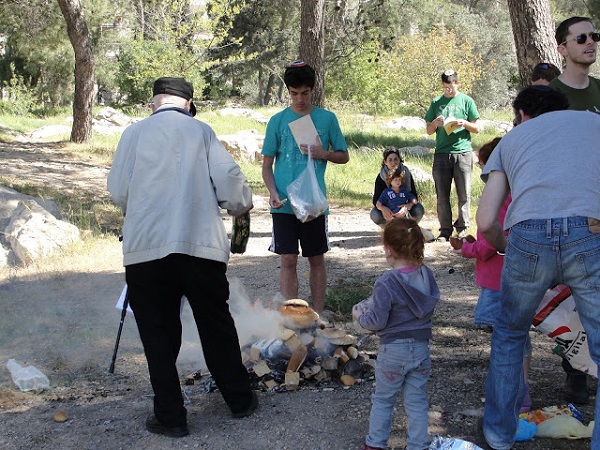
See the challah burn! Photo: Judy Lash Balint
Once that's done Jerusalemites will be able to ease into the Passover holiday in a spruced-up, cleaned up city, ready to receive whomever else in the world might feel like dropping in for a visit.
Need to stock up on household goods? Pre-Pesach is the time to do it, as stores compete to offer rock-bottom prices on dishes and cutlery. The 85 NIS price ($25) for a perfectly nice set of china dishes for 6, kind of makes up for gas prices, which stand at a high of almost $8 per gallon.
Bank Hapoalim, which like every bank in Israel charges a fee for every single transaction, redeems itself slightly on Passover by underwriting free entrance to 45 sites, museums and attractions throughout the country during chol hamoed.
Meantime, on Pesach the extent of the dire poverty of hundreds of thousands of Israelis is exposed. Latest figures indicate that roughly 20.5% of Israeli families live below the poverty line. Moreover, 24.7% of Israel's residents and 35.9% of its children live in impoverished families.
Families and the elderly form almost endless lines in every city around the food banks and soup kitchens that do their best to provide the basics necessary to celebrate the holiday.
In every ultra-orthodox neighborhood during the week before Pesach, men and boys block the narrow streets with hand trucks piled high with sacks of carrots, potatoes, oranges and cartons of eggs--all courtesy of the Kimcha D'Pischa funds that funnel donations from abroad to the Haredi communities, specifically for Pesach food.
Meanwhile, for those who have read this far, here's the Many Ways You Know Pesach is Coming To Israel list
1. The Israeli Army presses into service some 200 IDF chaplains including reservists, to commence the massive task of kashering the hundreds of kitchens, mess halls and eating corners used by soldiers all over the country.
2. Street scenes in Israel change every day before Passover according to what is halachically necessary: In the days before the holiday, yeshiva students wielding blowtorches preside over huge vats of boiling water stationed every few blocks on the street and in the courtyard of every mikveh. The lines to dunk cutlery, kiddush cups and the like start to grow every day, and, at the last minute, blow torches are at the ready to cleanse every last gram of chametz from oven racks and stove tops lugged through the streets.
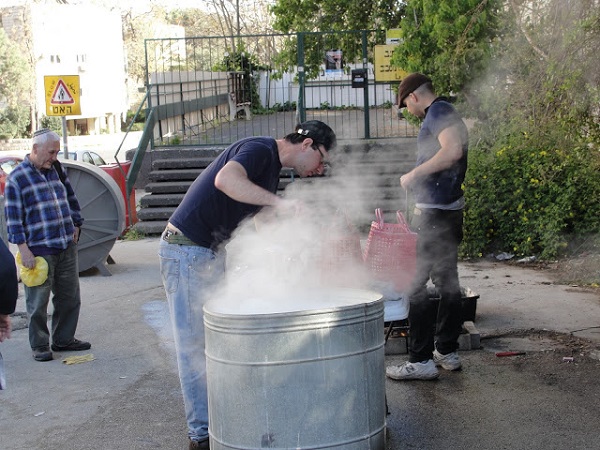
Photo: Judy Lash Balint
3. No alarm clock needed here--the clanging garbage trucks do the trick as they roll through the neighborhood every morning during the two weeks before Pesach to accommodate all the refuse from the furious cleaning going on in every household. Two days before the Seder there's the annual pick-up of over-sized items and appliances. Dozens of antiquated computer monitors and old toaster ovens stand forlornly next to the garbage bins on their way to the dump.
4. The day before Passover, families replace the yeshiva students on the street, using empty lots to burn the remainder of their chametz gleaned from the previous night's meticulous search. In vain, the Jerusalem municipality sets up official chametz burning locations and issues strict orders banning burning in any other areas. Yeah, right!
5. Most flower shops stay open all night for the two days before Pesach, working feverishly to complete the orders that will grace the nation's Seder tables.
6. Meah Shearim and Geula merchants generally run out of heavy plastic early in the week before Pesach. In a panic, I make an early morning run to the Machane Yehuda market to successfully snap up a few meters of the handy counter-covering material.
7. Observant Jews mark the seven weeks between Passover and Shavuot by carrying out some of the laws of mourning--one of these is the prohibition against cutting hair, so good luck if you haven't scheduled an appointment for a pre-Pesach/Omer haircut. You won't get in the door at most barber and beauty shops.
8. Mailboxes are full of Pesach appeals from the myriad of organizations helping the poor celebrate Pesach. Newspapers are replete with articles about selfless Israelis who volunteer by the hundreds in the weeks before the holiday to collect, package and distribute Pesach supplies to the needy.
9. Since most of the country is on vacation for the entire week of Pesach, all kinds of entertainment and trips are on offer. Ads appear for everything from the annual Boombamela beach festival, kid's activities at the Bloomfield Science Museum, concerts in Hebron, explorations at the City of David, solidarity excursions to Sderot and music festivals at the Dead Sea.
10. Pesach with its theme of freedom and exodus always evokes news stories about recent olim. This year, general immigration numbers are up five percent over 2016 numbers. Some 28,400 new immigrants arrived, the majority from Russia and Ukraine. Only 2,900 US Jews arrived in 2017, and French aliya dropped by 28% from 2016, despite the increase in anti-semitic incidents there.
11. This just in: According to Israel's Brandman Research Institute study, 43 million people hours will be spent nationwide in Israel's cleaning preparations for Passover this year. How does that break down? Of those cleaning hours, 29 million are done by women and 11 million by men. Paid cleaners make up the remaining 3 million hours at a cost of NIS 64 million ($15.6 million).
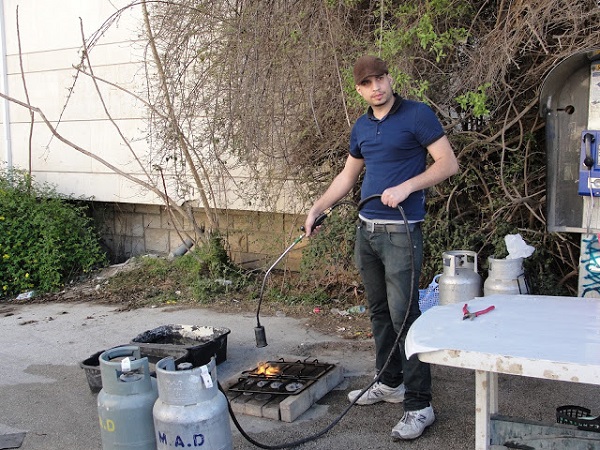
Photo: Judy Lash Balint
12. Israel's chief rabbis sell the nation's chametz to one Hussein Jabar, a Moslem Arab resident of Abu Ghosh. Estimated worth: $150 billion, secured by a down payment of NIS 20,000. Jabar took over the task more than 15 years ago, after the previous buyer, also from Abu Ghosh, was fired when it was discovered his maternal grandmother was Jewish.
13. Sign of the times? A few years ago, former Sephardi Chief Rabbi Mordechai Eliyahu issued a ruling that Viagra may be taken on Pesach provided the pill is encased in a special empty capsule so that the drug itself is not in direct contact with the body.
14. At the Kotel workers perform the twice-yearly ritual (pre-Pesach and pre-Rosh Hashanah) of removing thousands of personal notes from the crevices of the Kotel to bury them on the Mt of Olives.
15. Guess who's Buying matza? According to Iyad Sharbaji, the manager of Gadaban Supermarket at the entrance to the Galilee Arab town of Umm al Fahm, his matza is consumed entirely by local Arabs. Sharbaji told Haaretz that he generally stocks up on matza for Passover and has to replenish stock before the end of the holiday due to keen demand by locals.
16. It turns out the avid consumption of matza is not a new trend in Arab towns and villages, whose inhabitants view the traditional Jewish food as nothing more or less than a welcome and refreshing change in the menu. "It's not a religious issue, and certainly not a political one," Sharbaji explains.
17. The Passover theme of freedom and exodus in Israel even extends to criminals. Israel Radio announced that 700 prisoners will get a furlough to spend the holiday with family.
18. According to the Ministry of Agriculture, Israel’s fishmongers will sell 1,100 tons of carp, 80 tons St. Peters fish and 300 tons of mullet this Passover season to satisfy the tastes of gefilte, as well as Moroccan-style-chraime, fish eaters.
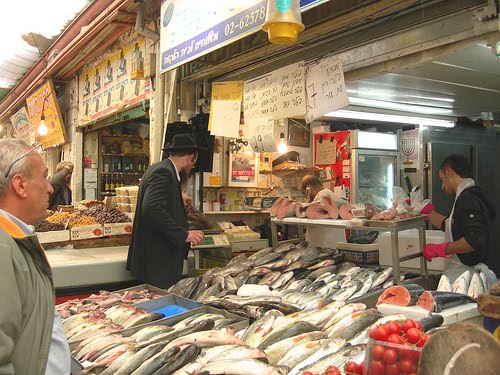
Gefilte fish? Photo: Judy Lash Balint
19. For some reason, it's become expected practice for companies to give their workers gifts on Passover (and Rosh Hashanah...) The Tovanot Market research firm found that some 1.5 million workers in Israel receive gifts from their employers at this time of year. Most generous is the Dead Sea Works whose workers get a check for NIS 1780 (about $495) + an iPad.

Judy Lash Balint is a Jerusalem-based freelance writer. She is author of Jerusalem Diaries: In Tense Times and Jerusalem Diaries: What's Really Happening in Israel. Judy hosted the Jerusalem Diaries Show on VoiceofIsrael.com and is currently a staff member at a leading Jerusalem think tank. Her articles have appeared in publications worldwide.
Recommended for you:
PASSOVER: MAKE A DIFFERENCE
Here are some ways you can get involved this Passover and make a difference in the lives of Israelis
About the Author



